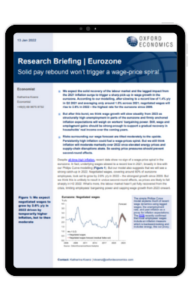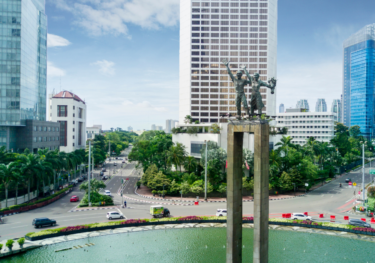Solid pay rebound won’t trigger a wage-price spiral in the eurozone

We expect the solid recovery of the labour market and the lagged impact from the 2021 inflation surge to trigger a sharp pick-up in wage growth in the eurozone.
What you will learn:
- According to our modelling, after slowing to a record low of 1.4% y/y in Q3 2021 and averaging only around 1.5% across 2021, negotiated wages will rise to 2.6% in 2022 – the highest rate for the eurozone since 2009.
- But after this burst, we think wage growth will slow steadily from 2023 as structurally high unemployment in parts of the eurozone and firmly anchored inflation expectations will weigh on workers’ bargaining power.
- Risks surrounding our wage forecast are tilted moderately to the upside.
Tags:
Related research

Post
Eurozone: Little sign of harm from the Red Sea disruptions
The impact of Red Sea shipping disruption on the eurozone economy continues to be limited, in line with our baseline view. Our new Eurozone Supply Stress Indicator suggests that supply pressures have returned to normal following a period of easing in 2023.
Find Out More
Post
GCC: Key themes shaping city economies in the near term
For Gulf cities, the near-term outlook will be tied not only to the global macroeconomic backdrop, but also the progress of the diverse visions and strategies in the region. With the aim to diversify their economies and reduce the dependence on oil, Gulf states continue to invest in the non-oil economy and implement various reforms. That said, oil revenues remain key to funding diversification efforts.
Find Out More
Post
Indonesia rate cuts will bolster credit demand, with pockets of risks
We forecast Bank Indonesia will start cutting its policy rate in Q2, which will provide a cyclical tailwind for credit growth and consequently domestic demand, as lower real lending rates will help boost loan demand.
Find Out More